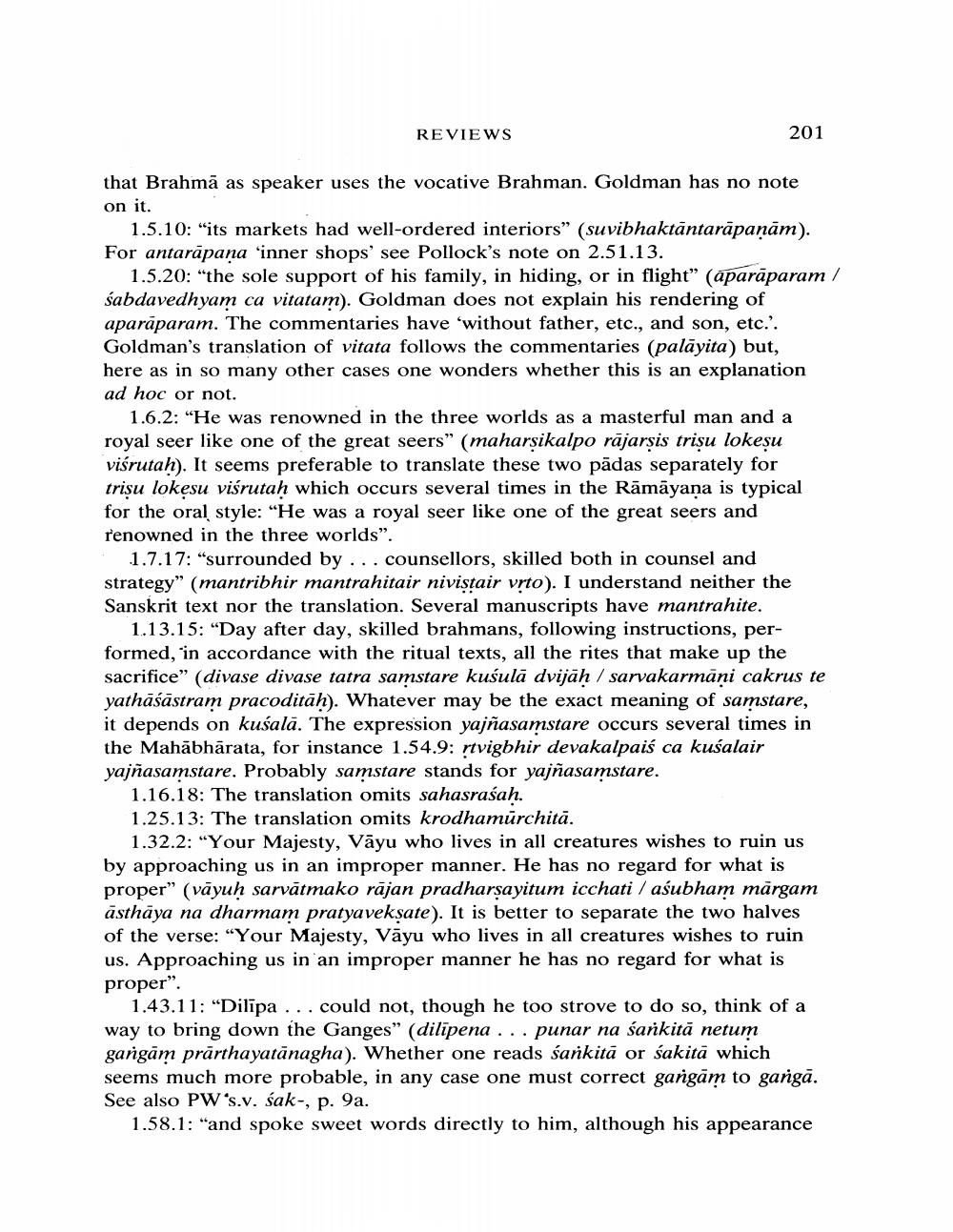Book Title: Reviews Of Diffeent Books Author(s): J W De Jong Publisher: J W De Jong View full book textPage 7
________________ REVIEWS 201 that Brahmā as speaker uses the vocative Brahman. Goldman has no note on it. 1.5.10: "its markets had well-ordered interiors" (suvibhaktantarāpanām). For antarāpaņa 'inner shops' see Pollock's note on 2.51.13. 1.5.20: “the sole support of his family, in hiding, or in flight" (aparāparam / śabdavedhyam ca vitatam). Goldman does not explain his rendering of aparāparam. The commentaries have 'without father, etc., and son, etc.'. Goldman's translation of vitata follows the commentaries (palāyita) but, here as in so many other cases one wonders whether this is an explanation ad hoc or not. 1.6.2: "He was renowned in the three worlds as a masterful man and a royal seer like one of the great seers” (maharsikalpo rājarșis trișu lokesu viśrutah). It seems preferable to translate these two pādas separately for trişu lokesu visrutah which occurs several times in the Rāmāyana is typical for the oral style: "He was a royal seer like one of the great seers and renowned in the three worlds". 1.7.17: "surrounded by ... counsellors, skilled both in counsel and strategy" (mantribhir mantrahitair nivistair vrto). I understand neither the Sanskrit text nor the translation. Several manuscripts have mantrahite. 1.13.15: "Day after day, skilled brahmans, following instructions, performed, in accordance with the ritual texts, all the rites that make up the sacrifice" (divase divase tatra samstare kusulā dvijāḥ sarvakarmāņi cakrus te yathāśāstram pracoditah). Whatever may be the exact meaning of samstare, it depends on kusalā. The expression yajñasamstare occurs several times in the Mahābhārata, for instance 1.54.9: rtvigbhir devakalpaiś ca kućalair yajñasamstare. Probably samstare stands for yajñasamstare. 1.16.18: The translation omits sahasraśaḥ. 1.25.13: The translation omits krodhamūrchită. 1.32.2: "Your Majesty, Vāyu who lives in all creatures wishes to ruin us by approaching us in an improper manner. He has no regard for what is proper" (vāyuh sarvātmako rājan pradharsayitum icchati / aśubham mārgam āsthāya na dharmam pratyaveksate). It is better to separate the two halves of the verse: "Your Majesty, Vāyu who lives in all creatures wishes to ruin us. Approaching us in an improper manner he has no regard for what is proper". 1.43.11: "Dilīpa ... could not, though he too strove to do so, think of a way to bring down the Ganges" (dilīpena ... punar na sarkitā netum gargām prarthayatānagha). Whether one reads sarkitā or sakitā which seems much more probable, in any case one must correct gangām to gangā. See also PW's.v. sak-, p. 9a. 1.58.1: "and spoke sweet words directly to him, although his appearancePage Navigation
1 ... 5 6 7 8 9 10 11 12 13 14 15 16 17 18 19 20 21 22 23 24 25 26 27 28 29 30 31 32 33 34 35 36 37 38 39 40 41 42 43 44 45 46 47 48 49 50 51 52 53 54 55 56 57 58 59 60
